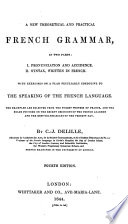 | Hallard - 1813 - 330 pages
...V.-."... I-?.\i. •-.--. .' OBSERVATION 2. Tout, when the direct object of a^erb, is placed after it in simple tenses, and . between the auxiliary and the participle in compound tenses ; as, // avoue lout, He confesses all. // a tout avoii.6, He has confessed all. 3. But when... | |
 | Jean-Pons-Victor Lecoutz de Levizac - French language - 1828 - 466 pages
...in the plural, as, Us ne sonl marts ni fun ni I'autreA Tout, and rien, when the regimen direct, are placed after the verb, in simple tenses, and between the auxiliary and the participle, in compound tenses, as, il 7. Minds that possess any correctness, examine things with attention, in order to give... | |
 | Joseph F. A. Boeuf - French language - 1829 - 274 pages
...forsakes iu at the moment of death. In this case it may be used as an objective direct, and is then placed after the verb in simple tenses, and between the auxiliary and the verb in compound tenses. Ex. II a tout ;ivime, he has confessed every thing. All followed by the relative... | |
 | Joseph F. A. Bœuf - French language - 1832 - 404 pages
...forsakes us at the moment of death. In this case it may be used as an objective direct, and is then placed after the verb in simple tenses, and between the auxiliary and the verb in compound tenses. It precedes, however, a verb in the infinitive. Ex. : II a tout avoue, He... | |
 | Jean-Pons-Victor Lecoutz de Levizac - French language - 1833 - 476 pages
...the plural, as, Us ne sont mnrtt ni I'un ni l'autre.1 Tout, and rien, when the regimen direct, are placed after the verb, in simple tenses, and between the auxiliary and the participle, in compound tenses, as, il 7. Minds that possess any correctness, examine things with atlion, in order to give... | |
 | Jean Pons victor Lecoutz de Levizac (d.1) - 1834 - 494 pages
...a fait prefcrer les, &c. — bombast, bouffissure. 716. Tout and rien, when the regimen direct, are placed after the verb in simple tenses, and between the auxiliary and the participle in compound tenses ; as, // avoue tout ; il n? avoue rien ; il a tout avoue ; il n'a rien avoue. 717. But when... | |
 | Alain Auguste Victor de Fivas - 1840 - 328 pages
...coup, suddenly; tout à fait, entirely. SITUATION OF THE ADVERB. Adverbs, in French, are generally placed after the verb, in simple tenses, and between the auxiliary and the participle, in compound tenses ; as, Il a souvent parlé de voua. | Hi: hcu often spoken of you. II parle souvent de vous.... | |
 | A F. Guillerez - 1843 - 80 pages
...Ex.: // est (fort) hevreutf, he is very happy. BULE II. The adverb, in general, is placed immediately after the verb in simple tenses, and between the auxiliary and the participle past, in compound tenses. Ex. : Celui qui juge (d la hate), juge (assess ordinairement maf), he who... | |
 | Charles Jean Delille - 1844 - 476 pages
...frequently are in English, between the nominative when a conjunctive pronoun and the verb, but are generally placed after the verb in simple tenses, and between...the auxiliary and the participle in compound ones ; as, Je vous le donne volontiers, I willingly give it you. J'ai Hen dormi, / have slept well. At the... | |
 | Désiré Pontet - 1844 - 286 pages
...whether it be the pronouns je, tu, il, elle, nous, sous, ils, elles, or a substantive, and pas 1 point after the verb in simple tenses, and between the auxiliary and the participle past in compound tenses. 3. OBSERVATIONS ON THE VERBS CONJUGATED NEGATIVELY AND INTERROGATIVELY. —... | |
| |